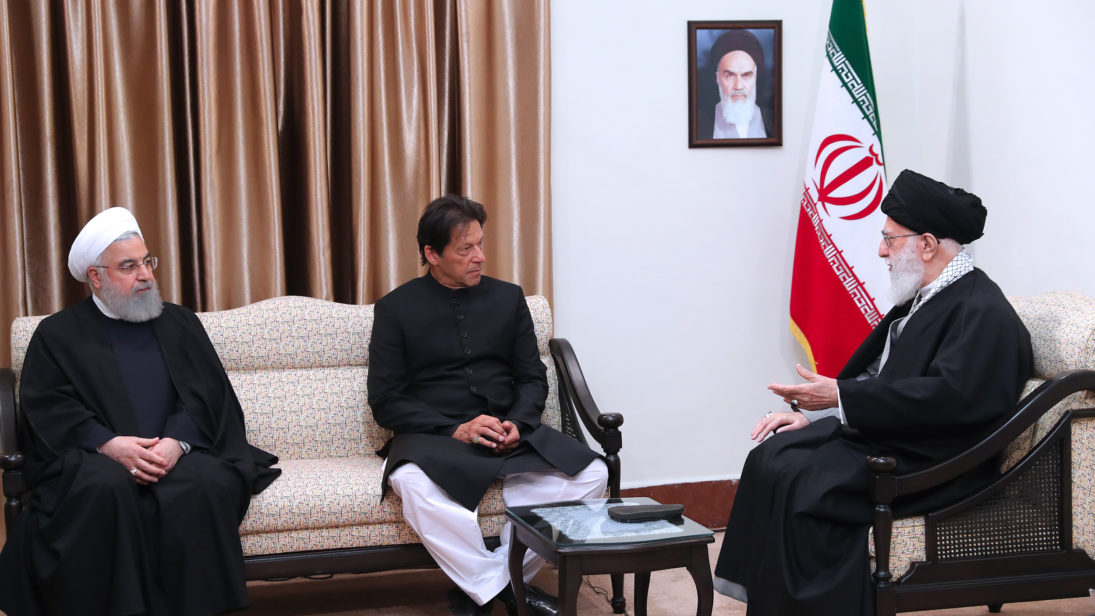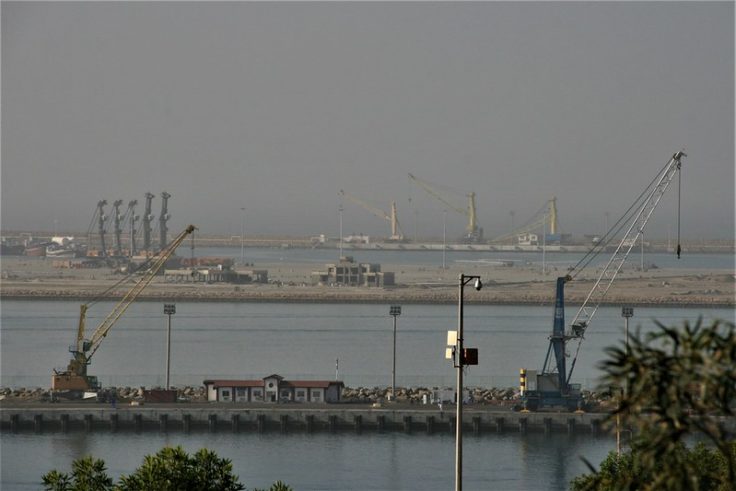
Recently, the New York Times reported that Iran and China had drafted a USD $400 billion economic and security agreement. The proposed agreement is poised to not only strengthen ties between the two countries but also likely to increase China’s foothold in the region. At this stage, however, it is unclear whether China has ratified the terms of the agreement or not. Additionally, Iran has not formally approved the deal. By virtue of being Iran’s neighbor and China’s regional partner, Pakistan will undoubtedly be affected if the agreement materializes.
Given the unofficial status of the agreement, Pakistan has not officially reacted to the news, and thus it is difficult to ascertain how Islamabad will adjust to this new development. Nevertheless, this proposed agreement could prove to be a boon for Pakistan-Iran relations for two key reasons. First, increasing China’s stakes in both Iran and Pakistan will push China to play a more pronounced role in ensuring that the two countries improve bilateral ties and cooperate in areas such as border security. Second, China’s influence in Iran could help Pakistan balance its ties with Iran and Saudi Arabia, and ease pressure that Saudi Arabia may try to exert on Pakistan to distance itself from Iran.
Border Instability in the Pakistan-Iran relationship
The China-Iran agreement is likely to eventually raise Chinese economic interests along the Pakistan-Iran border, as the proposed agreement reportedly includes investments in infrastructure such as ports, railways, and telecommunications, which would amplify the need to maintain peace and stability in the region to protect infrastructure projects. The Pakistan-Iran border has been a source of tension between the two countries — occasional cross-border firing coupled with accusations and counter-accusations have long deteriorated relations between the two neighbors.
With Beijing’s interests in the region likely to increase, China may push both countries towards taking more meaningful initiatives, which Iran and Pakistan have previously committed to, to counter destabilizing elements on the border.
To achieve stability in the border regions, Beijing could play an all-important role in encouraging Islamabad and Tehran to improve relations. There are two factors that could enable China to take the lead in helping Pakistan and Iran revitalize their bilateral relationship. First, both China and Pakistan have rekindled the China-Pakistan Economic Corridor (CPEC). A series of deals in the power and transport sectors have reinvigorated the project, with both China and Pakistan looking to further speed up the completion of the mega-project. Both countries, thus, would not want to see subversion on the Pakistan-Iran border that could disrupt CPEC-related initiatives.
Even before news of the purported China-Iran deal was released, it was reported that Pakistani security forces launched a clearance operation against terror outfits along the border with Iran—one of the groups targeted in the operation was the Balochistan Liberation Army (BLA) which has launched attacks against Chinese entities and CPEC projects in Pakistan. Continued militancy and terrorism could likely hamper Pakistan-Iran relations, forcing the two countries to resort to recrimination. With Beijing’s interests in the region likely to increase, China may push both countries towards taking more meaningful initiatives, which Iran and Pakistan have previously committed to, to counter destabilizing elements on the border.
Iran’s Chabahar Port is another avenue for China to help mend ties between Pakistan and Iran. A strategic port lying close to Iran’s border with Pakistan, the Chabahar port was to be operated and built by India, as per a deal signed between Tehran and New Delhi. While Iran has continuously stressed that the Chabahar port does not rival China’s development of Pakistan’s Gwadar port, fears of India challenging CPEC deepened when India took over the operations of Shaheed Behesti port in Chabahar. Additionally, Pakistan’s capture of an Indian spy who had infiltrated from Iran to Balochistan in 2016 (although India has denied this) raised apprehensions and concerns about India using its Chabahar network to foment trouble in Pakistan.

However, given that Iran had reportedly dropped India from one of the key projects in Chabahar, there is a chance that one of the biggest irritants in Pakistan-Iran relationship will subside. Though both Tehran and New Delhi have denied that India has been dropped from the port project, the continued delays on the project can be exploited. China could use this window to invest in Chabahar, while enhancing the connection between the ports in Gwadar and Chabahar. Given a growing Sino-Indian rivalry in the region, China’s infrastructure project in Iran, coupled with the establishment of a linkage between Gwadar and Chabahar, would be a way to forestall India’s forays in the area. Notably, Iran and Pakistan have discussed linking both ports. This could bring much-needed stability in the area and be a win-win for stakeholders in Iran, China, and Pakistan.
Balancing Iran-Saudi Arabia Ties
China could also be instrumental in helping Pakistan navigate the Iran-Saudi Arabia rivalry in a bid to augment its ties with Iran. In the past, Pakistan has struck a fine balance in its relations with Saudi Arabia and Iran. However, this approach has been tested time and again. Pakistan’s absence from last year’s Kuala Lumpur Summit—a conference held to deliberate issues in the Muslim world—ostensibly due to Saudi pressure in December, was the clearest manifestation of how difficult it is for Pakistan to walk a tightrope between both countries. That the leaders of Malaysia, Turkey, Qatar, and Iran were part of the Summit while Saudi Arabia was not extended an invitation was considered a veritable threat to Saudi Arabia’s preponderance in the Muslim world. Pressure for Pakistan’s to withdraw from the summit represents how opportunities to improve ties with Iran have remained limited.
This is where China can support Pakistan. China’s efforts to keep Pakistan and Iran positively engaged with each other are likely to outweigh the strings and pulls that accompany a partnership with Saudi Arabia. The events of the past year have shown that Pakistan-Saudi Arabia bilateral relations have been less than ideal. While Pakistan has been frustrated by Saudi Arabia’s lack of support on Kashmir, China, in contrast, has visibly supported Pakistan. Most recently, China deposited USD $1 billion in the Pakistan State Bank on the same day Pakistan repaid this amount to Saudi Arabia as part of the loan repayment Saudi Arabia asked for following Pakistan’s insistence that the Organization of Islamic Cooperation pressure India on Kashmir.
China’s unremitted backing of Pakistan provides a breathing space to Pakistan even when it comes to ameliorating ties with Iran. As Pakistan can count on Chinese support in fending-off Saudi threats of pulling back financial aid, Beijing could be expected to shield Islamabad from the risks of Riyadh’s pushback that would arise with improvements in Islamabad-Tehran relations. In other words, strong China ties with both Pakistan and Iran will improve Islamabad’s ability to navigate the challenges of pressure from Riyadh if it moves to improve its relationship with Tehran.
If the China-Iran deal moves forward, it is likely that China would support strong Pakistan-Iran ties to protect its economic interests in the region.
If the China-Iran deal moves forward, it is likely that China would support strong Pakistan-Iran ties to protect its economic interests in the region. Given that the Prime Minister of Pakistan Imran Khan recently argued that Pakistan’s economic future lies with China, it is almost certain that Pakistan will value and respect China’s interests if the latter undertakes initiatives to bolster Pakistan-Iran ties. However, this could negatively affect Islamabad’s ties with both Washington and Riyadh. The United States would likely worry about Chinese influence in Pakistan and the push it is giving to Iran while Saudi Arabia would be concerned over the likelihood of Pakistan getting closer to Iran. Riyadh could react by pulling back financial assistance, downgrading support in the international fora, or reneging from plans to invest in Pakistan.
However, Pakistan has already committed to improving relations with both Iran and Saudi Arabia, without getting into a zero-sum game. With stakes in border stability higher than ever, Pakistan, with Chinese support, will find it attractive to engage with Iran. For its part, Washington cannot arm-twist Islamabad over its relations with Tehran, as such efforts will be impeded by Beijing’s interests and stakes in bringing Islamabad and Tehran closer to each other. Pakistan has to, however, ensure that its efforts to turn a page with Iran are not dubbed anti-Saudi Arabia.
If the reported projects of the drafted China-Iran deal go through, China’s role in the region and on Pakistan’s Western border will grow in the coming years. If Beijing is focused on infrastructure projects in both Iran and Pakistan, this could incentivize China to play a more prominent role in supporting Pakistan-Iran relations. Further, as China’s main regional partner, Pakistan stands to be in an important position for coordinating economic connectivity in the region. Pakistan, therefore, should tread carefully as China-Iran ties develop, in a bid to continue being a balanced and positive actor in the region.
The views expressed in this article are those of the author and do not represent those of the organization he works for.
***
Click here to read this article in Urdu.
Image 1: Ali Khamenei via Wikimedia Commons
Image 2: Diethelm Scheidereit via Flickr


